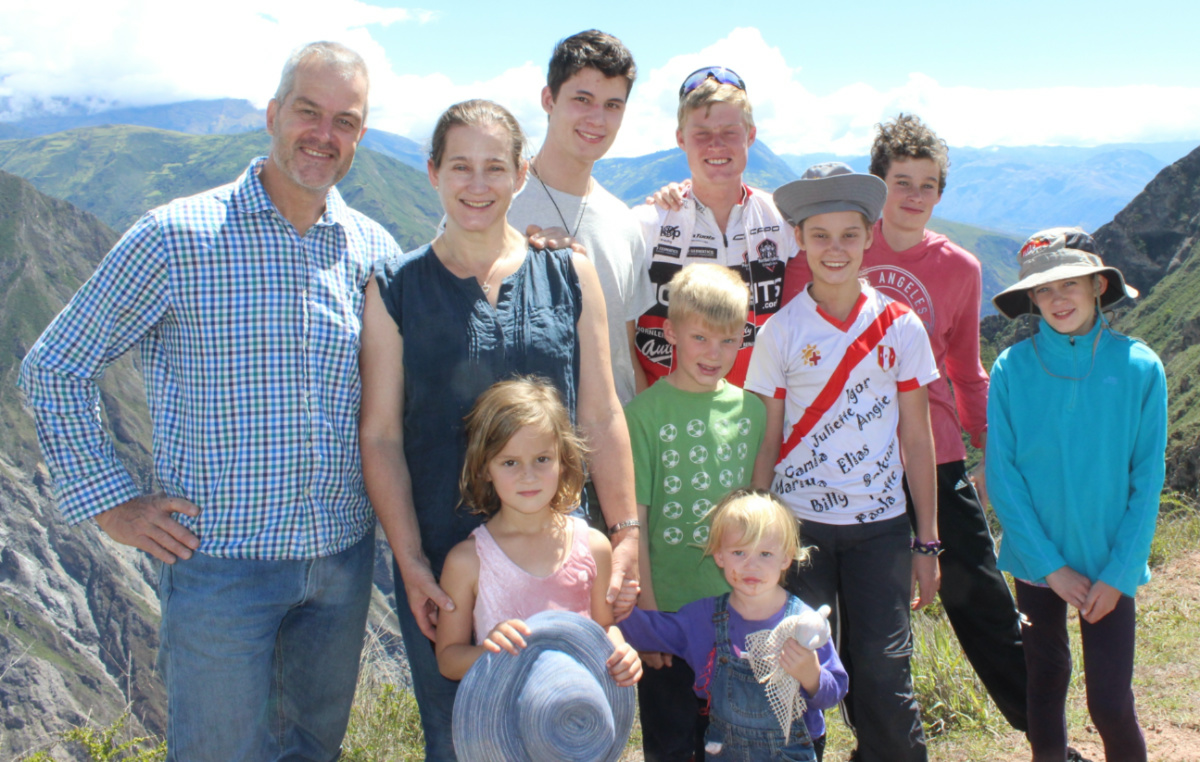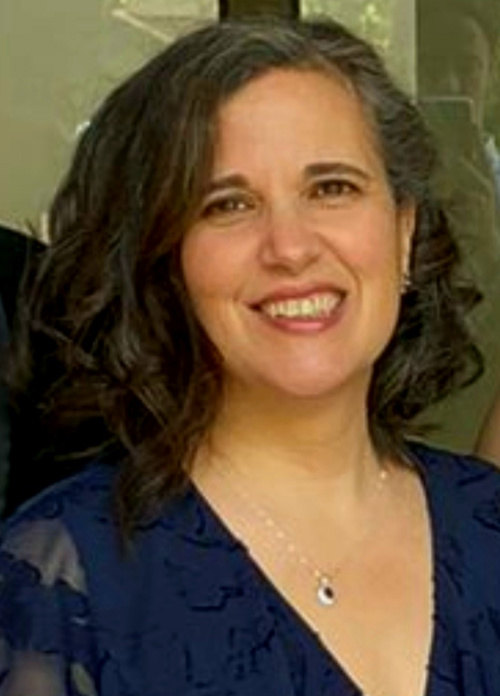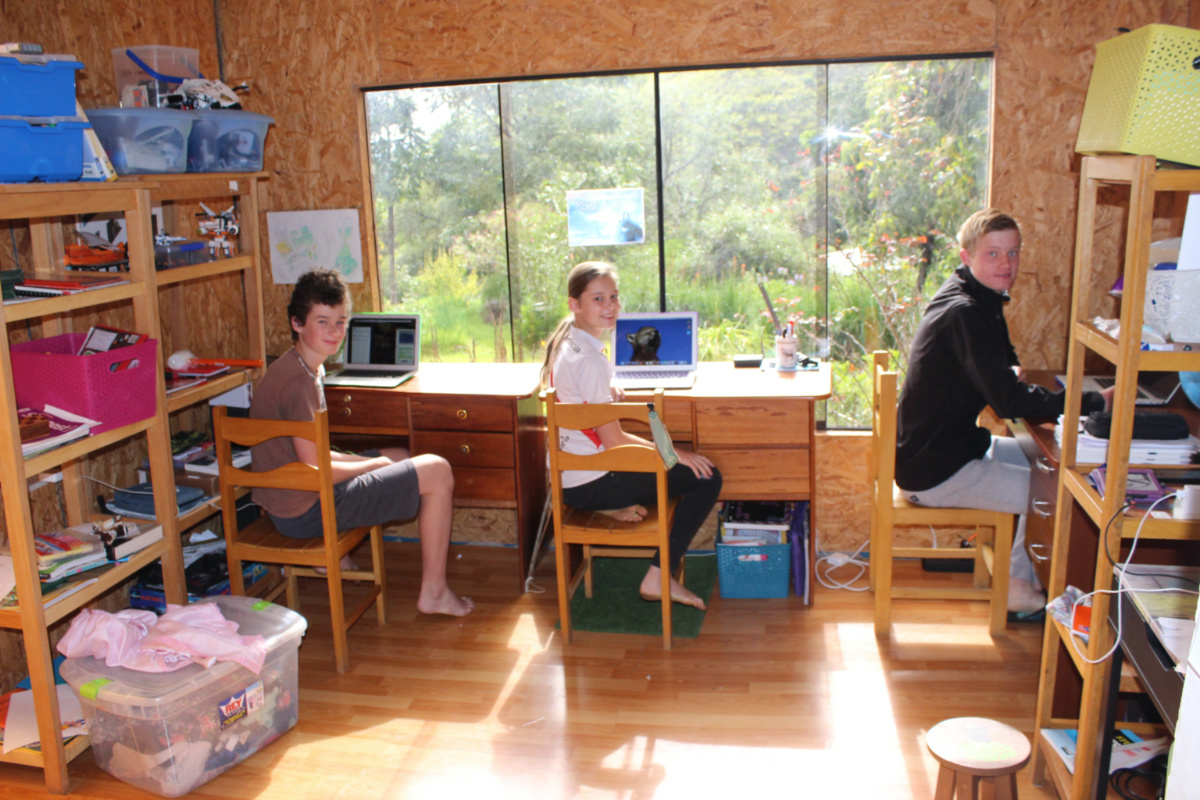
DAVID ADAMS reports…
Geelong, Australia
When Australian Sandi Welch and her husband Chris decided to relocate their family to a small village in Peru’s Andes Mountains in 2016 to be involved in establishing a Christian radio network, their children’s education was a key consideration.
Their eight children, who were aged between 17-years-old and 10 weeks at the time of their deployment, had previously undertaken a variety of schooling styles in Australia – including attending school in-person, home schooling and distance education. When they arrived in Peru, they initially attended a language school before continuing their education at a school located in the German mission hospital, Diospi Suyana, where the Welch’s were involved in building the radio network from scratch.

The Welch Family in Curahuasi, Peru, on 22nd December, 2018. PICTURE: Courtesy of Sandi Welch
Prior to returning to Australia in 2019, however, the two children then in high school turned to online learning to help with their re-entry. They enrolled in a distance education program offered by Australian Christian College to help ensure they were up-to-date with the Australian curriculum.
“We started ACC again to help with their transition back to Australia, to help the kids catch up with the curriculum standard that Australia required and to help them adjust back into the Australian culture a little bit…” says Sandi. “Doing that term, it caught them up a lot and when we moved back to Australia we had a studying routine that moved with us.”
“I think it is fair to say that the education of children long been a factor in people’s consideration about missionary service but the range of options that are now available to people is far greater than it was 20 or 30 years ago and so I think it does make it easier.”
– John B, who has previously spent 28 years in the field of educating mission and third culture children in Asia.
The Welch’s experience of online learning is one that’s become increasing common among the children of missionary families, part of a larger group of ex-pat children known as “third culture kids” or TCKs.
Spurred on by the forced online learning experience of the COVID-19 pandemic, the internet is changing the way children of Australian missionary families are educated and has opened the way for them to be able to continue to learn from the Australian curriculum in a way they couldn’t before.
“I think it is fair to say that the education of children long been a factor in people’s consideration about missionary service but the range of options that are now available to people is far greater than it was 20 or 30 years ago and so I think it does make it easier,” says John B*, who has previously spent 28 years in the field of educating mission and third culture children in Asia.
He says that while boarding schools were traditionally “the only option” for educating the children of missionaries, the past few decades saw the trend swing towards home-schooling as well as enrolling children in mission and international day schools close to where the missionary family was living. In the wake of the coronavirus pandemic, however, online learning has become increasingly feasible and popular.
One big reason surrounding the ability of children to be able to access the curriculum of their home or sending country, particularly as they look towards further study at university once they return.
“It was OK to do home-schooling or alternative local options during their primary school years but once they hit high school, it became more difficult and people would often come home,” John notes.
And while distance education was always possible via mail, the internet has significantly enhanced that option.
“Distance education and home-schooling have really been enhanced because of the internet,” says John. “Because people can do Facetime, they can do Zoom lessons…It’s made a huge difference to the learning process for many mission families.”

Analy Alfonso, children and families worker for Pioneers. PICTURE: Supplied.
Analy Alfonso, Melbourne-based children and families worker with mission organisation Pioneers, agrees that the COVID-19 pandemic has significantly boosted the use of online learning among missionary families.
“It was already growing as an option because of our technology…[but] now I think its exponential – the growth and opportunity…” she says.
But she says that deciding whether to go down the online learning route or have children attend local schools still remains a dilemma for some families heading into cross-cultural missionary work as they weigh up the social advantages of attending an in-person local school with the curriculum advantages online learning can provide.
“So it’s a dilemma and the problem is that each family will have a variety of personalities,” says Alfonso. “One kid will do really well learning from home and seems to need very little exposure to peers and the rough and tumble of same-age people. And another child is an absolute social butterfly and is going downhill at a rapid rate because they’re isolated, everything’s online, it’s not the same, they don’t have the normal interactions.”
She says that as a result many families are opting for a hybrid model which might include attending a local Christian or international school but also completing some studies online at home.
“That’s certainly been a growing demand from families, recognising that sometimes one or the other is not the full picture.”
We rely on our readers to fund Sight's work - become a financial supporter today!
For more information, head to our Subscriber's page.
Adelaide-based Kath Williams, who has been involved in teaching missionary children online via the now closed New Zealand-based 3H school, agrees that the experience of the COVID-19 pandemic has changed attitudes toward schooling.
“It opened the idea that schooling can be online which is fantastic because it actually helps family stay together on the mission field,” says Williams who currently works as missionary organisation Interserve’s third culture kids’ advocate and national TCK coordinator for Missions Interlink.
“In the past, [families] haven’t been able to stay together – [children have] been sent off to boarding schools and stuff like that. And that’s often hard on the kids, there’s often anxiety around the kid going off to boarding school…”
Aside from the fact that families are kept together, Williams says one big advantage of online learning is the flexibility, meaning children can study around family or community commitments. It also frees up when missionary families are able to go on furlough.
Williams says many students she works with choose to study the International Baccalaureate program – which is recognised by Australian universities. But for those that choose not to study through the IB program, having access to the Australian curriculum through online schooling in those upper years makes the transition to Australian universities much easier.
Williams has co-authored a new book, Thongs vs Flipflops, coming out later this year which is aimed at third culture kids who can struggle reintegrating with Australian society after being away, especially when that may mean moving into a different school year than the one they were in overseas or when they grew up in a culture that is very different to that in Australia.
“So being aware of stuff – like the grief and loss [they feel] because they’ve had to say goodbye to people they love – is one of the biggest things,” she says. “They have to adapt very quickly to Australian culture…and just learning to understand the culture itself is a big thing…They may [be] Australian but they may not feel like it. I’ve had a kid tell me once that they felt like an ‘alien’ when they first came back to Australia.”
Williams says she’s also looking to produce a pamphlet for teachers so they can better understand how to support third culture kids returning to Australia.
“Often there’s a lot of issues that don’t get dealt with,” she says.

The Welch family at their latops in Curahuasi, Peru, on 11th February, 2019. PICTURE: Courtesy of Sandi Welch
Sandi Welch, meanwhile, says that her children’s experience of online learning was a positive one.
“Studying through Australian Christian College has become a tradition for our family,” she says. “We now begin when each child reaches year seven. ACC has enabled us to transition from home school into formal schooling whilst keeping the bonuses of home schooling. It has been a positive experience for our family.”
John B’s name has been withheld at his request.
ENSURING EDUCATIONAL CONTINUITY
One Australian educational organisation offering distance education – including for children overseas with missionary families – is Australian Christian College, part of Christian Education Ministries.
Luke Reifler, head of distance education for Australian Christian College in New South Wales, says if students are travelling out of New South Wales for up to 12 months, they can currently enrol as distance education students (although the time limit is set to be lifted from next year).
At ACC in New South Wales, that includes some children families are on short-term missions in places like Lebanon, Tonga and Thailand.
“The families just want to maintain that Australian curriculum, that Australian study, so that when their children come back, it’s more of a seamless transition,” says Reifler.
Based at Marsden Park in Sydney, Reifler says ACC’s distance education offering is based around on-demand learning.
“So we’re not all doing English at 9 o’clock on Tuesday,” he says, adding that this means time zones generally don’t matter (a boon particularly for internationally-based students such as children whose families are on the mission field).
Students submit work online and there are opportunities to have facetime with teachers through live tutorials or one-on-one contact via email or instant messaging. A counsellor is also available and those students that are able can attend an in-person week at the school each term. Students can also connect via a series of clubs.
“We speak very strongly to families about the importance of recognising social isolation and being involved in local church, local sports, local clubs, just to make sure that they’re not really isolating themselves from the world,” Reifler notes.






